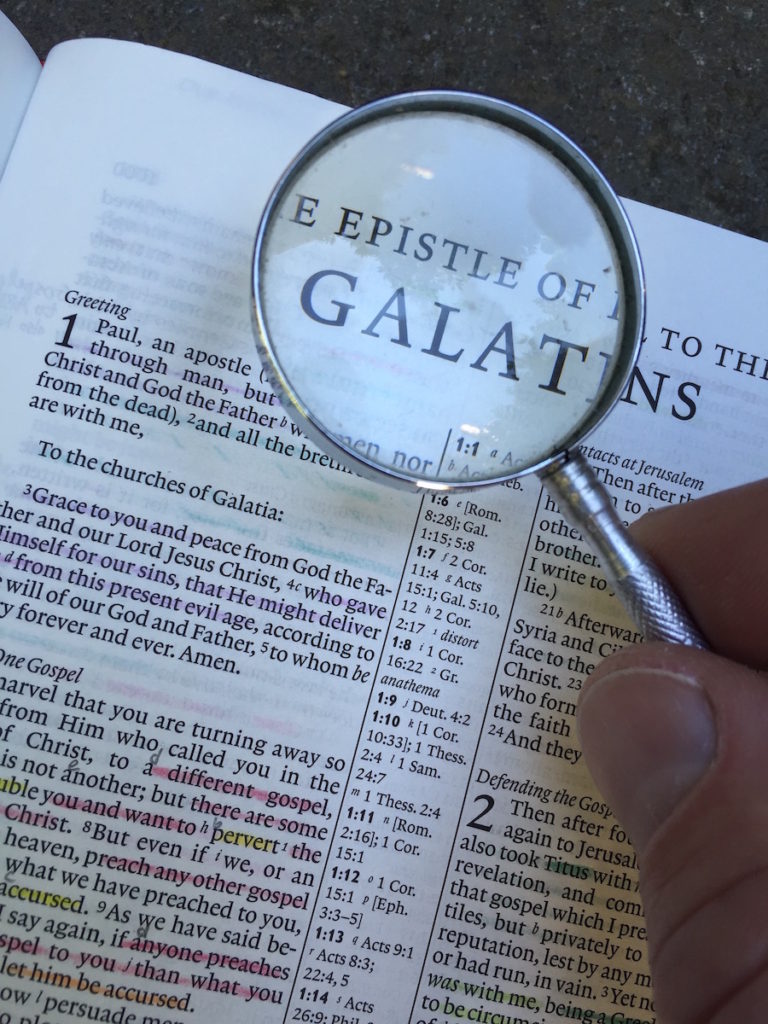
I love the book of Galatians! Why? One reason is this: The more difficult and controversial a biblical book, chapter or passage is, once understood by the light of YHVH’s Spirit, the greater the opportunity for the light of YHVH’s truth to shine through and illuminate the darkness of men’s understanding for His glory! Besides that, I like challenges and understanding the Epistle to the Galatians provides a challenge.
It has taken me decades to understand Galatians and to see how the mainstream church has twisted its message to make Paul say things he is not saying at all! Once understood, it is plain to see that what the church’s view that the book of Galatians teaches in one way or another against the Torah-law DOES NOT line up with the truth of the rest of Scripture. Therefore, is Scripture wrong or the church? I choose the latter. Let Elohim be true and every man a liar…
Definition of Terms in Galatians
Definition of Terms in Galatians
The Epistle to the Galatians can be challenging to understand due, in part, to the legal language and concepts that Paul the academically trained Torah-law scholar employed therein. To help us to understand Galatians, it is imperative to know the definitions of some of the words found in this small epistle. To help in this daunting task, I have drawn upon, among others, the Jewish New Testament Commentary by Dr. David Stern who is also the translator of the Complete Jewish Bible.
- The law (the Torah)
The Torah of Elohim as contained in the first five books of Scripture (the Penteteuch [Greek] or Chumash [Hebrew]). Defined literally, Torah in Hebrew means “teachings, precepts, instructions [in righteousness].” In the Jewish religion the term Torah can have both broader and narrower meanings than just the five books of Moses: (a) the entire Tanakh (or Old Testament); (b) the Oral Law; (c) or strictly the legal code (non-narrative) parts of the first five books of Moses.
- The law versus [a] law
In most cases where the term the law is found in the English New Testaments, the definite article the is not part of the original Greek (this can be verified by consulting a Greek interlinear), even though the English translators have not italicized it indicating it as a word which has been added by the translators to clarify the meaning of the text (as they have in the KJV and NASB Bibles). The term law by itself (without the definite article the preceding) can, at times, simply refer to: (a) any legal code of do’s and don’ts without reference to faith, heart conviction or love; (b) legalism; (c) a perversion of the Torah into a system of do’s and don’ts to earn, merit or keep Elohim’s love and favor and thereby to receive salvation; or the law of sin and death, which is the lawless and rebellious flesh nature at work in one’s life.
- Under [the] law
Galatians 3:23; 4:4, 5, 21; 5:18; also Romans 3:19; 6:14, 15; 1 Corinthians 9:20, 21. The phrase under [the] law can alternatively be rendered under subjection to legalism, according to David Stern. Finally, let’s look actually at the Greek word under as it is used in the phrase under law.
The Complete Jewish Bible (by David Stern) translates the phrase under [the] law as under legalism (see Stern’s Jewish New Testament Commentary, p. 344 where he explains why). Stern explains here that the word under is the Greek word upo which means “controlled by (as in under the control of or in subjection to sin,” see Rom 3:9). He reasons that if one is not controlled by or in subjection to law or legalism, then how is one under, controlled by or in subjection to grace? In the same sense that we have accepted Yeshua’s yoke which is easy and light to be under (Matt 11:28–30), this is in contrast to the yoke of legalism which is not easy and light to be under.
Stern contends that YHVH’s people are living en (i.e. within the framework of Torah, but not to be upo (i.e. in subjection to) legalism. YHVH’s people are in a faith/trust relationship with him and always have been under grace and “under” Torah (a gracious subjection), but never under legalism (a harsh subjection) (Jewish New Testament Commentary or JNTC, p. 374).
- Elements of the world
Galatians 4:3. Refers to the elemental [demonic] demigod spirits that the dualistic hellenized heathens worshipped and who were supposed to live in the spheres above the earth and who controlled life on earth (see Stern’s JNTC, pp. 556–557).
- Weak and beggarly elements
Galatians 4:9. Stern says that when Gentiles observe the Torah festivals of YHVH neither out of joy in sharing what YHVH has given to them nor out of spiritual identification with them, but out of fear induced by legalists who have convinced them that unless they do these things, YHVH will not accept them, then they are not obeying the Torah but subjugating themselves to legalism; and legalism is just another species of those weak and miserable elemental [demonic] spirits and no better than the idols they left behind (JNTC, p. 557).
- Under a schoolmaster
The Complete Jewish Bible translates schoolmaster as custodian. In his JNTC (p. 553), Stern explains that the word translated as schoolmaster in the KJV and other English Bibles is the Greek word paidagogos which literally means “boy-leader”. In ancient Greece a paidagogos was a slave who conducted a boy to and from school and was not actually the school teacher. You can verify this definition in Webster’s dictionary. As languages evolve words change in meanings. Therefore, a secondary modern meaning of pedagogue is a “teacher or schoolmaster” and pedagogy is the science of teaching. Stern explains that the ancient Greek paidagogos had no teaching function and although the Torah had as one of its goals the leading of Jewish people to the Messiah, as Paul explicitly states at Romans 10:4, that is not the import of the present verse. The paidagogos actually would have been a harsh disciplinarian for the Jewish people, providing some protection but generally making the Jewish person aware of many transgressions so that Jews might turn from legalistic rule-following and be declared righteous legally on the basis of faith and being faithful to Yeshua, whose trusting faithfulness to God the Father purchased our salvation.
- But
Galatians 2:11. The word but (KJV) is better translated as and, furthermore, moreover, and not but as in opposition to.
- The Jews’ religion or Judaism
Galatians 1:13, 14. The word Judaism (NKJV) is referring to non-Messianic Judaism, not to the those Jews who were disciples of Yeshua the Messiah and Torah-obedient.
- Hagar versus Sarah
Galatians 4:22–31. Here we see a Jewish midrash which is an in-depth biblical lesson in story form. Often it involves interpreting the Tanakh through allegorical and not literal interpretation. In this passage we see that Abraham tried to obtain YHVH’s promises through works by working out YHVH’s plans and purposes for his life through his own effort. As a result, he took matters into his own hands (works) and conceived Ishmael through Hagar instead of waiting in faith on YHVH to bring him a son through Sarah.
Conversely, Isaac represents obtaining YHVH’s grace and favor (salvation) through faith and not works. Paul here draws a parallel between Hagar (who represents a works or legalistic approach to earning YHVH’s favor) and the Torah-commandments given on Mt. Sinai. If one hopes to achieve YHVH’s favor by the legalistic works of perfectly keeping all of the Torah-commandments then one is sure to fall short and miss the mark even as Abraham did in attempting to obtain a son of promise through Hagar.
This midrash underscores the fact that the Mosaic or Sinaitic Covenant was not a covenant of salvation. This was the purpose of the Abrahamic Covenant as Ariel Berkowitz so clearly points out in his book Take Hold (pp. 23–25). He says that the Abrahamic Covenant was a covenant strictly of grace which Abraham did not earn, merit or deserve, yet he received the promises and blessings of offspring, land and nations. Berkowitz goes on to write that if the Abrahamic Covenant was the covenant of promise then the Mosaic Covenant was the covenant of dwelling in that promise. Participation in the covenant of Sinai did not secure the promises given as a grace gift by YHVH to Abraham and his descendants. Rather, the Torah-covenant was given to keep the people of Israel in YHVH’s path of righteousness so that the promises YHVH made to Abraham and his descendents might come to fruition upon Israel. The Torah-covenant provided a means for Israel to fulfil it’s YHVH-ordained destiny, and it provide d a legal standard so necessary to an orderly society (ibid.).
A Quick Overview of the Book of Galatians
Below is a quick overview of the book of Galatians. My explanatory comments are in brackets.
Continue reading


